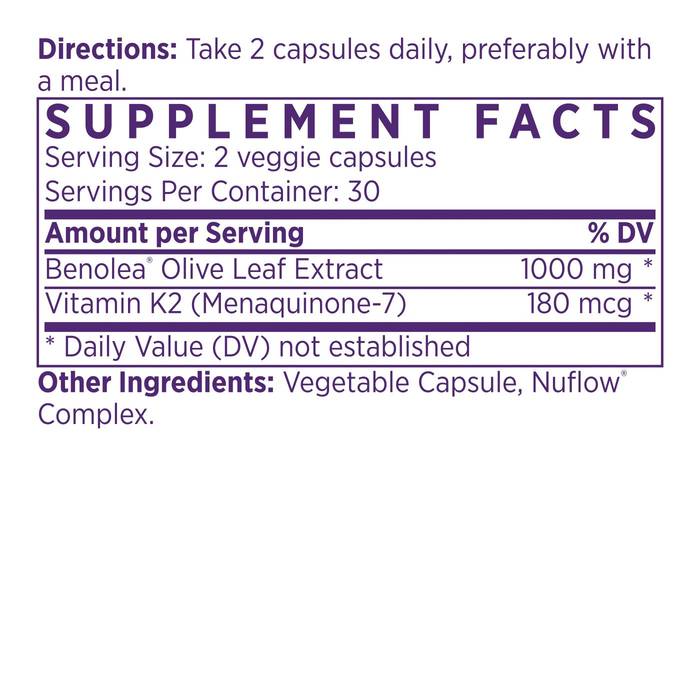NAOMI BP Advanced
PURCHASE OPTIONS






FOR EVEN BETTER RESULTS STACK IT WITH CITRUS BERGAMOT

Happiness Guaranteed
Your happiness is our #1 priority. That’s why our products are backed by our rock solid 365-day guarantee. If you have a problem, we will solve it. Refund it. Reship it. Whatever it takes. We’re here for you. Happiness. Guaranteed.




Ingredients trusted to promote healthy blood pressure*
Shields the cardiovascular system from excess calcium accumulation

Benolea® Olive Leaf Extract
A full 1,000 mg research-based dose of Benolea® olive leaf extract clinically shown to produce significant reductions in both systolic and diastolic blood pressure, as well as modest, but statistically significant reductions in total cholesterol and triglycerides after 8 weeks.*
LEARN MORE
Vitamin K2 as K2Vital® Delta menaquinone-7
This 100% bioactive form of vitamin K2 is vegan and has been clinically shown to reduce the risk of calcium deposits forming on blood vessel walls and arteries, helping to keep blood vessels and arteries flexible and pliable and blood pressure in the normal range.
LEARN MOREFrequently Asked Questions
What is blood pressure?
Maintaining normal blood pressure levels is one of the most critical aspects of good health.
Blood pressure is the amount of pressure it takes for your heart to push blood through your blood vessels and arteries. It’s the force with which blood pushes against artery walls, allowing your heart to move oxygen throughout your body, with your heart working like a pump and your blood vessels acting as pipes.
Normal, healthy blood vessels and arteries are flexible and can expand and contract as needed to maintain steady blood flow. But when blood vessels and arteries become stiff and are unable to dilate and relax, then the force needed to move blood through them increases.
Your blood pressure level is determined by the amount of blood your heart pumps, and how the blood vessels react to or resist that force.
It takes into account two different pressure readings:
- Systolic—measures how much pressure is exerted when your heart pumps blood through your blood vessels.
- Diastolic—measures how much pressure exists when your heart is at rest, in between beats.
Why has the healthy range for blood pressure decreased?
In 2017, the definition of high blood pressure changed according to guidelines from major health organizations, including the American Cardiology Association (ACA) and the American College of Cardiology (ACC).
Previously, blood pressure was considered to be within healthy range if it fell below 140/90 mmHg. But now, guidelines indicate an ideal reading is 130/80mmHg or below.
The ACA and ACC made the decision to lower the threshold to encourage interventions including lifestyle modifications and medications sooner, noting the detrimental effects of even marginally elevated blood pressure over time.
According to Dr. Teresa Iribarren, an Assistant Professor at Florida International University College of Medicine and practicing Internal Medicine physician specializing in Integrative Medicine and Preventative Cardiovascular Medicine:
“These lower baseline readings help to identify patients who are at risk early on, when implementing lifestyle changes and dietary supplements can interrupt the domino of risk factors that can lead to serious and, at times, sudden problems.”
How long does it take for BP Advanced to work?
As with any supplement, it takes time for the active compounds in the formula to accumulate in the body and start to work at the cellular level for optimal results. Studies have shown that some benefits may be seen after just 1 week and the studies of the Benolea® Olive Leaf Extract showed significant improvements in participants at the end of the 8-week trial.
What exactly is "Nuflow Complex" on the ingredient list?
Nu-FLOW® offers producers an option to replace synthetics or other anti-caking agents including SiO2, tri-calcium phosphate, or talc with a natural or certified organic ingredient. Using 'rice hulls’ gives a clean, consumer-friendly product while also solving anti-caking, flow and other manufacturing and/or production challenges. The unique functionality comes from the causes that rice plant to take up silica from the soil and concentrate it in the hulls of the rice. Thereby producing a natural alternative to silicon dioxide or other anti-caking/flow agents.
Is this a subscription product?
No. This offer is a one-time purchase with no monthly commitment.




















